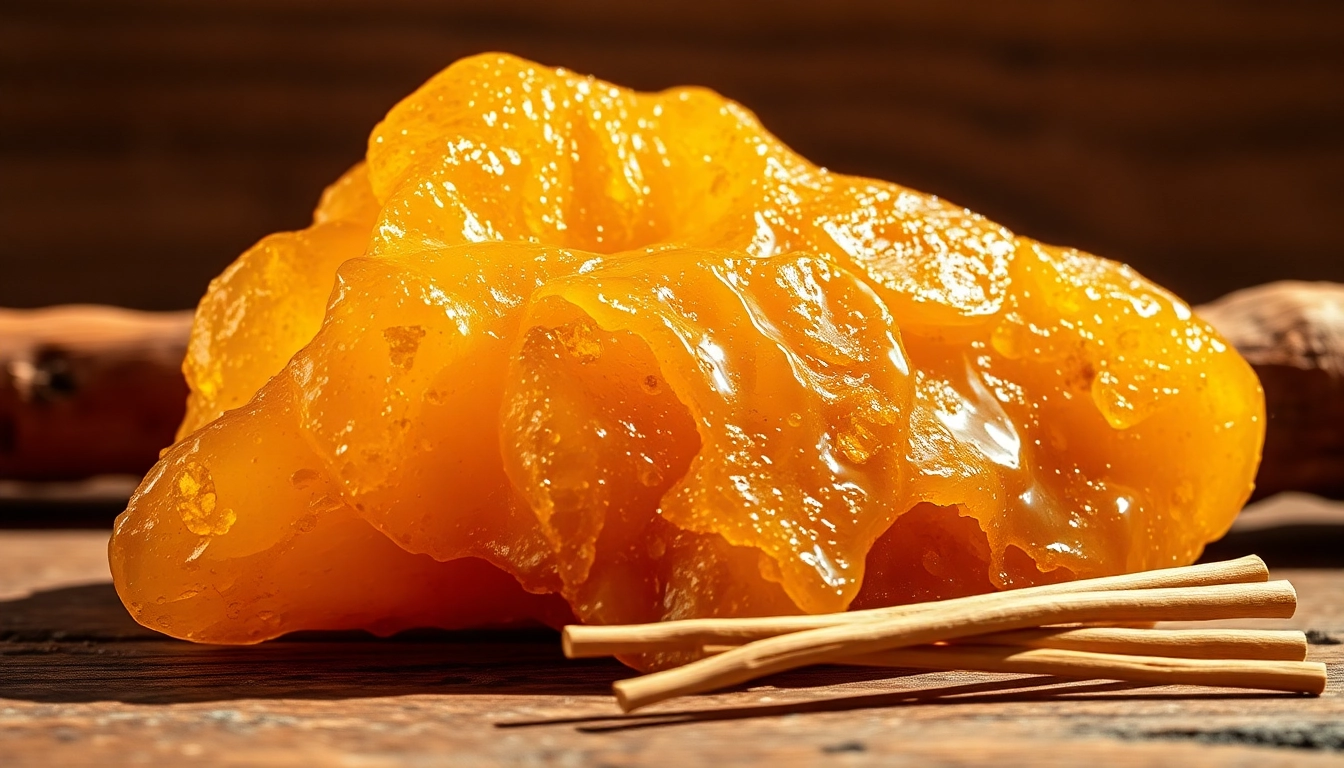Understanding Benjoin: What Is It?
Benjoin, also known as benzoin, is a fragrant resin derived from the bark of several species of trees belonging to the genus Styrax. Celebrated for its warm, sweet, and complex aromas, benjoin has been utilized across various cultures for centuries. This versatile resin not only finds its place in perfumery and incense but is also revered in traditional medicine for its therapeutic properties. The captivating scent of benzoin, reminiscent of vanilla and balsamic notes, makes it an appealing choice in aromatherapy and wellness practices. For those curious about this aromatic wonder, benjoin is a fascinating subject to explore.
The Composition and Types of Benjoin
Benjoin is primarily composed of volatile oils and resinous compounds which contribute to its scent and properties. The two most common types of benjoin are:
- Sumatra Benzoin: Known for its thick and sweet fragrance, Sumatra benzoin is primarily used in perfumery. It has a rich, creamy texture with hints of vanilla and spices.
- Laos Benzoin: This variety has a lighter, more balsamic quality compared to its Sumatra counterpart. It is often used in incense and aromatherapy for its soothing properties.
Both types are harvested in a similar manner but possess distinct characteristics that make them suitable for different applications. The chemical profile of benjoin includes compounds like benzoic acid and benzoin resin, enhancing its use in health and beauty products.
How Benjoin is Harvested
Harvesting benjoin involves collecting the resin from the bark of certain Styrax trees. This process, known as tapping, typically occurs during particular seasons when the sap is at its most fluid. Harvesters make incisions into the bark to allow the resin to flow out and harden upon exposure to air, forming what is known as ‘tears’. Each tree can be tapped repeatedly over the years, making this a sustainable practice when managed properly.
The resin is then collected and processed, often purified for different industrial applications. The quality of the resin can vary based on the tree species, harvesting method, and region, leading to a range of products in terms of scent and efficacy.
The Historical Significance of Benjoin
Historically, benjoin has been used in various cultures for its aromatic and medicinal properties. Ancient Egyptians employed benzoin in their embalming processes and rituals, while in traditional Chinese medicine, it has been utilized to treat cough, skin infections, and injuries.
In medieval Europe, benzoin was valued for its antiseptic and preservative characteristics, often added to incense during religious ceremonies. Its ability to create a warm, inviting atmosphere made it popular in homes and places of worship alike.
Even today, the essence of benjoin continues to permeate both spiritual and everyday practices, showcasing its timeless appeal.
Exploring the Benefits of Benjoin
The benefits of benjoin extend well beyond its pleasing scent. This remarkable resin offers various health advantages and applications, making it a valuable addition to both wellness routines and everyday products.
Health Benefits of Benjoin Resin
Benjoin resin is more than just an aromatic delight; it also boasts numerous health benefits:
- Antiseptic Properties: Benzoin has natural antiseptic properties, aiding in wound healing and infection prevention. It can be applied topically to minor cuts and abrasions.
- Anti-Inflammatory Effects: Due to its anti-inflammatory characteristics, benjoin may help reduce swelling and alleviate symptoms associated with respiratory conditions, such as bronchitis.
- Respiratory Relief: Inhaling benjoin vapors can ease respiratory troubles, promoting better lung health and reducing congestion.
These qualities make benjoin a popular ingredient in various herbal remedies and natural health products.
Aromatherapy and Mood Enhancement
In the realm of aromatherapy, benjoin is revered for its ability to influence mood and emotional well-being. When diffused or used in massaging oils, it can:
- Enhance feelings of tranquility and relaxation.
- Reduce anxieties and boost self-confidence.
- Promote deeper, more restful sleep.
The sweet and earthy scent of benzoin is particularly effective at creating a calming atmosphere, making it popular for meditative practices and relaxation spaces.
Uses of Benjoin in Traditional Medicine
Traditionally, benjoin has been utilized in various herbal medicine applications. Its versatility is evident in the following:
- Tinctures and Extracts: Benjoin is often included in tinctures to enhance their effectiveness in treating respiratory ailments.
- Topical Applications: Some cultures utilize benjoin in ointments for skin conditions, harnessing its antiseptic and soothing properties.
- Herbal Teas: Ground benzoin can be brewed into teas, offering a fragrant infusion with various health benefits, including cough relief and digestive support.
As interest in natural remedies continues to grow, benjoin remains a prominent figure in the landscape of holistic health.
Benjoin in Perfumery: Scent Profiles and Blending
The aromatic qualities of benjoin extend far beyond its traditional uses, making it a cherished ingredient in perfumery. Its warmth, sweetness, and complex notes lend themselves beautifully to a variety of fragrances.
How Benjoin Contributes to Fragrance Formulation
Benjoin acts as a fixative in perfumes, enhancing longevity and depth. It intertwines seamlessly with other notes, harmonizing floral, woody, and spicy elements:
- Base Notes: Its warm and balsamic characteristics render benjoin an excellent base note in perfume formulations, providing a rich foundation for other scents.
- Blending with Other Ingredients: Benjoin pairs well with vanillin, spices, and resins, creating intriguing profiles useful in both feminine and masculine fragrances.
Perfumers frequently turn to benjoin for its compelling ability to provide warmth and complexity, enhancing the overall olfactory experience.
Popular Benjoin-Based Fragrances
Numerous commercial perfumes feature benzoin prominently, showcasing its appeal in the fragrance world. Some notable examples include:
- Le Labo Benjoin 19: This scent weaves a story of amber, cedar, and musk around the central theme of benzoin, inviting wearers into a warm embrace.
- Diptyque Benjoin Bohème: An alluring combination of Laotian benzoin with balms and spices, creating a rich and mysterious profile.
These fragrances reflect the versatility and allure of benjoin as a fundamental element in modern perfumery.
Using Benjoin in Candle Making
Benjoin’s captivating scent is equally at home in candle making, producing a warm ambiance when lit. Here are some suggestions for incorporating it into DIY candle products:
- Choosing Quality Wax: Opt for natural waxes like soy or beeswax to enhance the resin’s scent and ensure a cleaner burn.
- Additives: Pair benjoin with complementary scents, such as vanilla or sandalwood, to create a balanced fragrance profile.
- Testing Ratios: Experiment with the amount of benjoin to find the right balance for your preferred scent strength.
By leveraging the unique properties of benjoin, candlemakers can create beautifully scented, high-quality products that elevate any space.
DIY Applications: Incorporating Benjoin in Home Products
The uses of benjoin extend into the realm of DIY home products, offering both aromatic and therapeutic benefits. Here’s how you can incorporate this resin into your everyday creations.
Creating Custom Incense with Benjoin
Making your incense using benjoin can be a fulfilling and aromatic project. Here are some steps to guide you through the process:
- Gather Ingredients: In addition to dried benzoin resin, you’ll require other botanicals like herbs and essential oils for a unique scent.
- Combine and Grind: Grind your ingredients together to achieve a fine powder, ensuring an even distribution of scent and burning properties.
- Forming Incense: Mix powdered ingredients with water or a binding agent to create dough-like consistency that can be rolled or molded into cones or sticks.
Once dried, your handmade incense can elevate your space with its delightful aroma.
Making Scented Candles with Benjoin Resin
For a more fragrant home experience, consider crafting your scented candles with benjoin. Follow these simple steps:
- Melt Your Wax: Gently melt your choice of wax, using a double boiler to avoid direct heat.
- Add Benjoin: Once the wax is melted, incorporate benjoin resin into the mix, ensuring it dissolves adequately into the wax.
- Pour and Cure: Pour the mixture into candle molds or containers and allow them to cure for a few days for the best scent throw.
The resulting candles not only provide an aromatic atmosphere but also showcase the beauty of natural ingredients.
Using Benjoin in Homemade Skincare
Benjoin can also be integrated into homemade skincare products due to its soothing and antiseptic qualities:
- Skin Creams: Infusing benjoin in creams can offer antimicrobial properties, ideal for those with sensitive or acne-prone skin.
- Face Masks: Incorporate benzoin into face masks for an anti-inflammatory effect, soothing irritated skin.
- Bath Additives: Add benjoin to bath salts or oils for a soothing, aromatic bathing experience.
Utilizing benjoin in skincare enhances the effectiveness of homemade beauty products, promising both luxury and efficacy.
Best Practices and Safety Considerations
Although benjoin is generally considered safe for various applications, it’s essential to adhere to best practices and understand potential safety considerations when using this resin.
Precautions When Using Benjoin Resins
When incorporating benjoin into personal care or therapeutic uses, consider the following precautions:
- Skin Sensitivity: Perform a patch test to check for any allergic reactions, especially if applying it topically.
- Avoiding Overconsumption: While benjoin can be beneficial in small amounts, excessive use may lead to adverse effects, particularly when ingested. Consult with a healthcare professional before use.
By practicing caution and mindfulness, users can safely enjoy the benefits of benjoin.
Choosing Quality Benjoin Products
Not all benjoin products are created equal; therefore, selecting high-quality options is vital for maximizing efficacy:
- Source Verify: Ensure that the benjoin resin is sourced from reputable suppliers, ideally organic or ethically harvested.
- Check Purity: Look for products that disclose their composition and avoid synthetic additives for the best results.
Purchasing quality products ensures you receive the benefits of benjoin without unwanted side effects.
Frequently Asked Questions About Benjoin
The interest in benjoin has led to several questions regarding its properties and applications. Below are some common inquiries:
- What scent is benjoin? Many describe it as warm, sweet, and balsamic, with earthy undertones reminiscent of vanilla.
- Can benjoin be used in cooking? While it is primarily used for its aromatic properties, limited culinary applications exist; always research first.
- How should benjoin be stored? Keep it in a cool, dry place away from direct sunlight to maintain its quality.
Understanding these aspects can further enhance your engagement with this remarkable resin.



